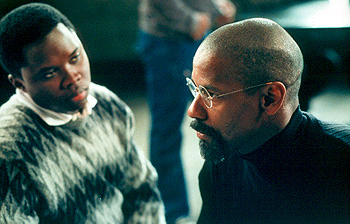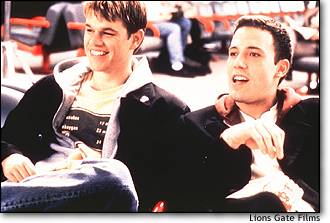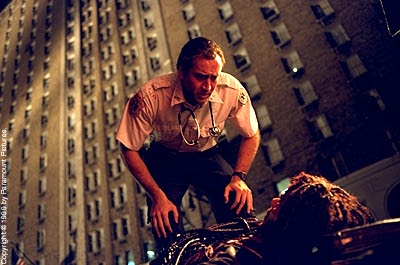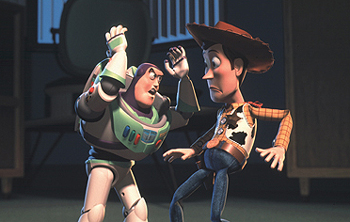|
OF 1999

For the first time in a couple of years, it was not a difficult choice to finally select the film that was the year's best for me. And I pretty much realized it the moment I finished the experience of seeing AMERICAN BEAUTY in the theatre this year, and I knew I had seen a film of a unique and incredibly high calibur, and I knew I had seen the year's best film. And even after a few more months of films were released, none could come close to rivaling the singular masterpiece that this film is, not only making AMERICAN BEAUTY my choice for the best film of the year, but also one of the top ten films of the 1990's decade.
Amazingly enough, this film came from a director who was making his feature film debut, Sam Mendes. This film, while telling a very interesting story, was also an actor's dream project, and every single one of the performances in the film are brilliant and accomplished. The film begins narrated by Kevin Spacey's character, Lester Burnham, as he tells us that he is already dead, and what we are about to see is the last year of his life. Lester is tired of everything, sick of his marriage, sick of his deadend desk job, sick of the way his life has turned out. He is desperately searching for something to reinvigorate his life, and when a strange next door neighbor, Ricky Fitts, befriends him, he finds the spirit to quit his job. And in a very strange twist, he also finds his sexual energy reinvigorated by the young friend of his estranged daughter, a teenage cheerleader who begins appearing to him in surrealistic dreams, including one where Lester looks up to his bedroom ceiling to see her naked surrounded by red roses. And while Lester is enduring this mid life crisis and trying to come to terms with his life, the people around him are also going through crises of their own, and the film and screenplay are absolutely brilliant in how they manage to make all of these characters all so well rounded and all so very intriguing. Lester's wife, Carolyn, played by Annette Bening, is just as detached from her marriage and has an affair. The Burnham's only daughter, Jane, played stunningly by Thora Birch, is completely estranged from her parents, and finds herself instead attached to the strange young man next door, Ricky, who continues to videotape her and everything for some strange reason. And even next door, there is tragedy. Ricky sells drugs, unknown to his incredibly strict military father, played brilliantly by Chris Cooper. And eventually, all their paths will intertwine in a stunning climax.
This film is brilliant on so many levels. While it's been classified as a tale of tragedy in suburbia, it's much more than that. It's a human tragedy, as all of us can see some parts of ourselves in these characters. Rare for Hollywood films, it's a character driven film, with characters who stick with you long after the film is over.
And I think the major success of this film is that each character is unique, and we get to experience each character's tragedy, and even more than that, we get to experience some incredibly powerful scenes of revelation for each of these characters. Lester's revelation by the end, when he finally comes to terms with his life after his own personal struggle and rebirth, is so incredibly moving, and perhaps the most moving in the film, particularly when he asks his daughter if she is happy, and honestly for the first time seems to find joy in knowing that his daughter is happy, and at the same time sadness for not being there before. Each character comes to a revelation by the end, even two very surprising revelations for Colonel Fitts next door, and the object of Lester's new desire, the young sexpot played by Mena Suvari. The revelations are so honest, and so convincing in their portrayal, and the tragedy is that almost all these revelations come too late, and these people's lives are changed forever.
Everyone seems in search of beauty in this film, beauty in different forms. And in one brilliant scene, Ricky finds beauty in the simple scene he videotaped of a plastic bag being blown about by the wind. This film is also about the things we keep hidden for so long, how we live on the surface and often neglect the truths of our inner souls. The film shows us that we can't always know somebody's true self based on what we see on the outside. The film has some comic moments, but ultimately it is one of the most unique stories about ourselves, and the lives we lead or may lead in the future. One of the signature lines of the film is "There is nothing worse than being ordinary" ... these people, as are most of us I imagine, are struggling to not be ordinary, to live a life full of purpose, to be needed by others, and when this doesn't happen, there is often tragedy. Lester Burnham is yearning for respect that he feels he deserves at this point in his life, and he's searching for the excitement of life, which when he finally finds, he ultimately loses it all.
Conrad L. Hall's cinematography is absolutely gorgeous, while Thomas Newman's score is moody and fitting for the themes of the film. The real triumph of this film is the crisply written screenplay, the first rate directing, and ultimately, the rich and nuanced performances. This film is about as close to perfection as cinema can get. There are images in this film that I will never forget, and this is a film more thoughtful and more powerful than any film I've seen in quite a while, and it's clearly deserving of the title of Best Film of 1999.
A very close number two, Paul Thomas Anderson directed one of the most astonishing, cutting edge, and deeply felt
films of recent times. Anderson, still a very young director, has already made a distinct mark on cinema history with
two powerful films, his 1997 success Boogie Nights, and now this, Magnolia, a film which assures
Anderson's place as perhaps the next Martin Scorsese or Robert Altman, and it makes one excited for the future of cinema.
While Boogie Nights seemed in the style of Scorsese, Magnolia is a film very much in the style of director
Robert Altman, and his films Nashville and Short Cuts, but it is still incredibly unique on its
own. The film is excessive and expansive, over three hours in length, and yet does not feel like three hours ... in fact,
I found myself wanting to see more of these characters and see more of what happens in their lives.
Like American
Beauty, this film is also a triumph for acting, as the film is more about the characters than any kind of plot. In
fact, Magnolia does not really have a plot. Instead, it interweaves the story of a variety of different
characters all during one day. The film is surprising and brilliant all the way through, with moments of surprise
followed by moments of sheer filmmaking genius. The movie begins unexpectedly also, as a narrator talks about
all kinds of bizarre incidents that happen, and ponders whether life is mere coincidence or that these things happen
for some kind of reason. It's very important that the viewer keeps that theme in mind throughout the viewing of the
film, as it will obviously affect their reaction to what unfolds. From there, the interweaving stories begin,
and the stories are so wonderfully crafted and edited by Anderson. Even more than some of Altman's achievements,
these particular characters are much more interweaved into each other, and have much closer binds and relationships.
In this expansive story, some are approaching death and reflecting on the sins of their past -- Jason Robards and
Philip Baker Hall give extraordinary performances as men facing the end of their lives, and trying to deal
with the things they did wrong. Some of the regular P.T. Anderson regulars show up here also, all giving different
performances from their ones before. Julianne Moore plays Earl Partridge's young wife, who regrets her sins of the
past and is having immense difficulty dealing with the impending loss of her husband. Philip Seymour Hoffman is
again effective as a male nurse tending to the dying Partridge, and John C. Reilly gives what I think is his best
performance to date as a decent cop who pursues a relationship with the drugged out daughter of Philip Baker Hall's
game show hosting character. Melora Walters gives a stunning and touching performance as a woman
suffering from her past and longing so much for redemption. Tom Cruise gives one of his best performances ever in a supporting part as
Robards's son who has become an embittered man who now gives seminars on the proper way to put women in their place,
and slowly has his whole front taken apart by a reporter who insists on digging up his past. The film continues
to build and build, leading to something which the audience never can guess, although Anderson hints at it throughout.
Paul Thomas Anderson has created a memorable motion picture about the intricacies of human relationships in our time .
It portrays the joys and burdens of family, love, and friendship with a depth that echoes the works of great European
filmmakers, a depth simply not seen in typical Hollywood movies, and this is what makes it so memorable. This
film is really about people, their pasts, their relationships, and how as much as they try to control their lives,
events out of their control will always take over. And Anderson takes bold steps, all executed perfectly. At one
point in the film, one of the many Aimee Mann songs in the film is played, and all of the characters begin to
sing along, and if you listen to the lyrics, it's a wonderful statement for all these characters ... "it's not
going to stop, till you wise up." It's such a bold move for Anderson, and it becomes one of the most memorable
sequences in the film. And finally, an event of divine intervention ultimately occurs, and the way it's handled
is so brilliant as it so completely unexpected. One can read Exodus Chapter 8, Verse 3 to understand
more clearly what is happening at the end, but it's really not as important to understand why it is happening
as to understand that it simply is one of those things, and this film has so much more to say about the
various lives we lead. Each character
in this film has made choices, mostly poor choices, but human destiny is not just the product of an
individual's choice, it is a combination of many people's choices crashing together with something else
more divine and out of our control. And ultimately, that's life.
By no means just a number three, THE INSIDER was also one of the most moving films of 1999. This film was based on a recent true story, telling the story of Jeffrey Wigand, who was once a top executive for one of the big tobacco companies. He felt an obligation to expose the truth of big tobacco, which wasn't just that cigarettes were bad for your health, but that all the CEOs of big tobacco all lied in front of Congress when they stated that they did not believe that nicotine was addictive. And even more than that, he claimed that he had discovered that the companies even put in more addictive and dangerous chemicals to keep individuals hooked on nicotine. He finally agreed to tell his story to Lowell Bergman, producer of the top rated news magazine show, 60 Minutes.
Russell Crowe gives one of the best, if not the best, performances of the year as Wigand, showing all the cycles that Wigand went through as the plight of one man taking on one of the biggest industries in America tore away at his livelihood, his family, and his soul. The film really has two stories to tell, both just as intriguing as the other. Once Wigand tapes his interview with Mike Wallace for 60 Minutes, the story then becomes the battle between the tobacco company and CBS, and the internal battles between some in CBS News and even CBS Corporate, as to whether they will air the interview. Al Pacino portrays Bergman in one his truly wonderful performances, as a man struggling for a similar kind of truth that Wigand has been fighting for. The two are so similar, but with different things to lose. Michael Mann does a superb job of again telling a very interesting story with brilliant performances and even more brilliant visuals. One of the most powerful scenes of the year was during Wigand's interview with Mike Wallace, and the camera continually moves in to Pacino's face as we see his reaction to the risk this man is taking in exposing the truth. One of the most powerful themes in movies is the fight of the lone individual against seemingly insurmountable odds, and this one is one of the best. Mann has given us one of the most honest and interesting films about broadcast journalism in this day and age, which makes it a worthy companion to the 1970's expose of print journalism, ALL THE PRESIDENT'S MEN. What makes both those films even better is the fact that what happened and the people involved are real.
Stanley Kubrick's 13th film, and his first in over ten years, sadly became his last, as he died shortly after completing
the film. The film was released to controversy and not as much box office for a film starring Tom Cruise, but for me
and some critics,
Kubrick's final effort was still one of his great films, as for the first time he really delved deep into the
human pysche as he done so brilliantly before into technical matters. Real life married couple Tom Cruise and Nicole
Kidman brought a strong sense of realism to a story of what happens in our marriages when jealousy invades,
and how our deepest desires and fantasies can cause damage if brought to the surface, or perhaps cause redemption.
Kubrick's visual style was again so brilliant in this film, and he created a thought provoking study of what happens
after Alice, played by Nicole Kidman, reveals to her husband how close she came to adultery, fantasizing about
one man she just briefly met in passing. After a frank discussion with Bill while high on pot, in a great piece of
acting by Nicole Kidman, she lays bare her soul, and in doing so, sets Bill off into the night fueled by a jealous
rage. He continually envisions his wife having sex with this man in his head, and over the next two nights, he will
come close to sleeping with a prostitute, coming up front and personal with people whose sexual dealings could be
called bizarre, and in the film's most intriguing moments, he attends an orgy in an opulent mansion, where a danger
seems to lurk. What's
most brilliant about this film is that it tells two stories of two people in a marriage losing their way and finding
their way back again. Alice becomes stronger for her marriage after getting her fantasies and dreams about having
sex with another man out in the open, while Bill takes a much more perilous journey to find his way back. And
although some criticized the final line of the film, it speaks volumes for the theme of the film, and its frankness
reveals the truth of these two sexual beings, and we sense their marriage may indeed be better for all they experienced.
Very rarely do we get major films which tackle the issue of sex honestly and intriguingly, mostly due to the fact
that audiences try to label it pornography, when it is really an artful attempt at examining the human sexual
condition, and when a true artist like Kubrick attempts that, it's something to pay attention to.
Although
the extremes in this mesmerizing film most likely do not happen to most married couples, the issues do, and Kubrick's
final gift to the world of cinema was a film as probing in its way to make you think about the human sexual condition
as was his visions in so many classic films that will be remembered for decades to come. We lost a true artist
with the death of Kubrick, but his films will always remind us of what a brilliant eye for cinema he truly had.
Frank Darabont finally returned to directing in 1999, after directing the acclaimed drama The Shawshank Redemption
back in 1994. His new film was another prison drama based on a Stephen King novel, but this was a much different
and in some ways more powerful achievement than what he achieved with Shawshank. The movie is another
expansive three hour epic for Tom Hanks, who plays a decent Death Row guard in the 1930's, who encounters a new
Death Row prisoner named John Coffey (notice his initials) who appears to have a miraculous gift of some kind,
even though he has been convicted and sent to Death Row for the murder of two young girls. The film is beautifully
shot, and even though most of the film takes place on this expanse of a Death Row cell, it never
feels too confined or too long. The sometimes leisurely pace of the film allows its characters
to have time to develop, providing the emotional backdrop for what comes ahead. It's a sometimes disturbing and
most times uplifting drama of a man with a gift to heal being forced to die for the sins of others (sounds like
another person from about 2000 years ago). It is never explained where Coffey gets his healing gifts, but it is
brilliant to watch this story unfold, especially the character of Tom Hanks who goes through his own spiritual and moral
crisis of sending one of God's true angels to the electric chair.
The film is harrowing in its portrayals of the real life reality of execution by electric chair, providing images
of death than one will not soon forget, including a horrifying sequence of an execution gone wrong,
where we are spared nothing in viewing what can truly go wrong with executions in the electric chair. The film is brilliant in how it balances such horror with such masterstrokes
of miracles in such a place, not only from the miracles performed by John Coffey but by a small mouse on the block who
gets affectionately named Mr. Jingles. The performances are first rate, not only from the always good Hanks, but to Michael
Clarke Duncan, who portrays John Coffey with such feeling and pain, and also to the true evil personified in
Doug Hutchinson's portrayal of the Death Row guard Percy, a man so much on the other
side of the moral fence from Tom Hanks's character. It's an incredibly moving story, filled with ideas
about life, death, and spirituality than leave one thinking about them long after leaving the theatre.
Norman Jewison commented at the 1998 Academy Awards when receiving the Irving G. Thalberg award that new filmmakers
should simply concentrate on finding good stories to tell, and he found a true story that was powerful and
emotional already on its own, its drama simply meant for a big screen treatment. Jewison gives us even more
drama than the story already had, and by casting Denzel Washington, brings a performance of fiery intensity and
passion to the screen.
Washington gives one of his greatest performances as Rubin "The Hurricane" Carter, a middleweight boxer, who was
wrongly framed by a racist cop for murders he did not commit. Two all-white juries convicted him of the crime
during the late 60's, when race relations were so troublesome in America. Initially, the film rushes through
several details of Carter's early life and his ultimate conviction and imprisonment. Finally, the real heart
of the story emerges when a young black man in Canada picks up Carter's autobiography and becomes determined
to meet Carter, and with the help of his Canadian friends, they successfully find new evidence and eventually
win Carter's freedom. Once the film slows down, it becomes a very uplifting story, all due to Washington's
performance. He brings us so deeply into Carter's psyche, making us experience the ups and downs of having
hope amidst all the years in prison, while experiencing despair as appeal after appeal is lost. He makes
us feel what it must have been like to be in Rubin Carter's mind as it was the only thing free for so many
years. Sure, it's a typical Hollywood rousing epic, but thanks to the work of Jewison and Washington, they
make it something truly memorable.
Even before it was released, as is typical of films that try to tackle the contradictory issues of religion,
various groups, and mostly the Catholic League, began attacking this film because they heard it was a satire of
the Catholic religion. And well it is indeed a biting satire of the Catholic Church, it does raise issues
that are problems in the Catholic faith, but what these people don't realize is that Kevin Smith's bold film
actually affirms the existence of God, which is what all religions should be happy with anyway. Sure, Smith's film is
filled with things that can offend just about everybody, but anyone with an open mind will find a sometimes
dark, sometimes humorous, and always intriguing and original film in Dogma. The story itself is
something you've certainly never seen before ... two angels, played by Matt Damon and Ben Affleck, are expelled
from heaven and discover a loophole in the Catholic faith which may get them back into heaven, but at the cost
of all of life as we know it. So God dispatches a truly unique group to help save the world, including Rufus, the
13th apostle, played by Chris Rock, an angel played brilliantly by Alan Rickman, and a woman who we discover is a
direct descendant of Jesus himself, played wonderfully and with a true sense of realism by Linda Fiorentino.
The film follows their journey to save their world, until ultimately God appears in the person of singer Alanis
Morrisette, who brings a joy to the idea of God, and by the end, director Kevin Smith has created one of the most
singularly unique films that we will most likely ever see on the screen, and tells a simple message which would be good
for everyone to pay attention to once and for all ... Organized religion, no ... God, yes.
After cinematic trips to worlds far removed from the mean streets of New York, one of our greatest living
directors, Martin Scorsese, made a triumphant return to New York, telling a story similar in structure and some
themes to his 1976 masterpiece, Taxi Driver, but different on its own, and one can tell when watching it
that Scorsese has indeed matured since then, and his style reflects that maturity. But no doubt about it,
this is a Scorsese masterpiece from start to finish, his unique stamp all over this film. Nicolas Cage is the
man traveling the 90's streets of New York this time, as an ambulance driver on the edge, looking for redemption,
just like the typical Scorsese character. The story follows him through three very different nights leading him
on dark journeys through the sufferings of people around the city. Each night, he travels with a different
partner, from John Goodman who simply looks at the job as a job, to Ving Rhames in an over-the-top performance
as an ambulance driver/preacher, and to the edgy and often violent Tom Sizemore, but the story is Cage's. The
ghost of a young girl he couldn't save once continues to haunt him, and he continues to see her all over the
streets. Scorsese leaves us with some truly powerful and dark images, including fireworks exploding over
the city while Cage tries to save a man impaled on a fence. The image of Cage taking the breathing tube
of an elderly man, who continually resents the doctors just keeping him alive, and wants to be set free to die
finally. The story of the elderly man continually populates the story, as does the elderly man's daughter, who ends
up forming a bond and unique romance with Cage's ambulance driver. Like all of Scorsese's greatest cinematic
works, the film leaves indelible images and again brings a story of a character's redemption uniquely to the screen.
And Scorsese is the clear master and is clearly at home when telling the stories of the underbelly of New York City.
It was the film that was a phenomenon all its own in 1999, showing the power of the internet to market a film,
and showing how a cheaply produced independent film can indeed reach a mass audience, to the tune of $145 million
at the boxoffice. But I think the success of this film lies in its truly experimental nature, as it redefines
the horror genre, and what is truly scary. After having so many pointless and worthless films claiming to be scary
horror films parading across cinema screens, The Blair Witch Project got back to the core of what horror truly is ..
the horror in our mind. Our imaginations can conjure up much more horrifying images than any film could ever put on
screen, and the filmmakers here feed on that by only giving us noises in the woods, and strange things left for
a group of three campers. The filmmakers successfully tried a new experiment in filmmaking in letting the three actors take the cameras
into the woods, and record their reactions to what the filmmakers conjured up. And no doubt the success of the film
initially came because the marketing made people think that this event actually happened, that three young film students went into
the woods to film a documentary, and never returned, and the film puts together their footage found a year later. But
more than that, the style of that type of film makes it incredibly unique, and it stands as a much more intelligent
piece of horror cinema. It's also a brilliant examination of group dynamics, and what happens between three individuals
as their fear overtakes them. And the final harrowing moments in an abandoned house where certain death awaits
rivals any kind of Hollywood monster portrayed on the screen. It was indeed a bold experiment, and spoke well for
the success of independent film as moviegoers realize there's more out there than just the big budget film paraded out
each week by Hollywood.
Most critics could not believe it. Very rarely, if ever, does a sequel come along that not only matches the
enjoyment and originality of the original, but in some respects surpasses it. In this way, Toy Story 2 even
brought comparisons with The Godfather Part II, becoming known as a successful sequel. And indeed it was ... 1999
was not only a great year for films in general, but also for animated films again, and the best animated film of the year
for me was the sequel from Disney and Pixar to their megahit film Toy Story, which achieved notoriety as the
first completely computer animated film in 1995. In the time since the original, the quality of computer animation
has improved significantly, so Toy Story 2 is even more vibrant and visually astonishing. But at the core
of this sequel is the same thing that made the original so memorable ... a great story. This time around, Woody
is stolen by a collector who desperately needs Woody for his RoundUp Gang toy collection, and Woody looks to end up
being encased in glass to be looked at for all time. But as the other toys try to rescue him, this time led on a rescue mission
by Buzz Lightyear, they try to convince him that toys belong to kids, and are meant to be played with. And the film
even brings tears to the audience as it portrays the plight of toys, and how they stay the same while the children
they exist for grow up and leave them behind. It's that kind of film that Disney can do so well above so many others,
making a film that appeals to kids on a completely different level while it also appeals to adults with themes they
can connect with. It
was a brilliant film, as many of the same talents returned, including Tom Hanks and Tim Allen voicing the leads.

ANY GIVEN SUNDAY
 |
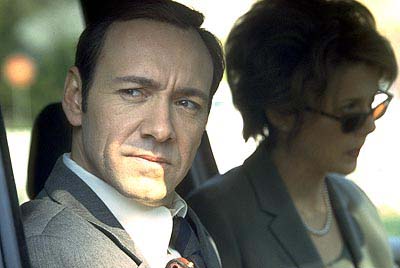
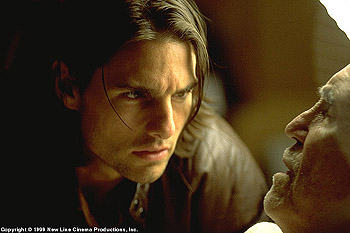
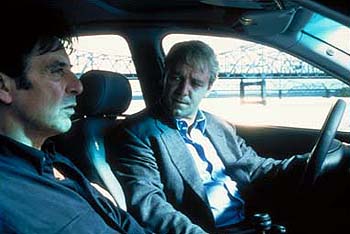
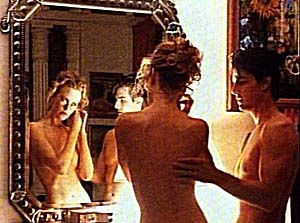
 The orgy in the mansion is the centerpiece of the film, as Bill experiences a world that he had no clue existed.
The sequence is vintage Kubrick all the way, except for the digitized "people" covering some of the more
explicit sex acts, but it's shot beautifully and staged so excessively as to suggest a world where
people of all kinds come together to experience pure animalistic sex with anyone and everyone.
The orgy in the mansion is the centerpiece of the film, as Bill experiences a world that he had no clue existed.
The sequence is vintage Kubrick all the way, except for the digitized "people" covering some of the more
explicit sex acts, but it's shot beautifully and staged so excessively as to suggest a world where
people of all kinds come together to experience pure animalistic sex with anyone and everyone.

